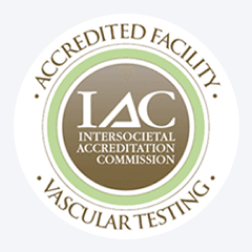Contents
- Understanding the Circulatory System and Vascular Health
- How Heat and Humidity Impact Blood Vessels
- Common Symptoms and Risks in Hot and Humid Weather
- Why People with Vein and Vascular Conditions Are More Vulnerable
- Practical Tips for Protecting Your Circulatory System
- When to Seek Help: Warning Signs and Complications
- Treatment Options: How Vascular Specialists Can Help
- Taking Charge of Your Vascular Health in the Heat
- Frequently Asked Questions
When temperatures rise and humidity levels spike, your circulatory system works harder to regulate your body’s temperature. For those living in humid climates with vein or vascular conditions, this added strain can lead to increased symptoms like swelling, discomfort, and fatigue.
That’s because heat and humidity cause blood vessels to dilate, which can worsen issues such as varicose veins or chronic venous insufficiency. If you already manage a vein condition, understanding how your environment affects your vascular health is key to preventing flare-ups and protecting your overall well-being.
Understanding the Circulatory System and Vascular Health
The circulatory system plays an essential role in keeping your body functioning optimally. It consists of the heart, blood vessels, and blood, working together to deliver oxygen and nutrients.
Blood vessels include arteries, veins, and capillaries, each serving a unique purpose. Arteries carry oxygen-rich blood away from the heart, while veins return deoxygenated blood back. Capillaries bridge these vessels, allowing nutrients to pass into tissues.
Vascular health refers to the state of your veins and arteries. Good vascular health ensures efficient blood flow, reducing the risk of complications such as clots.
To maintain a healthy circulatory system, consider these tips:
- Eat a balanced diet: Rich in fruits, vegetables, and healthy fats.
- Exercise regularly: Activities like walking improve circulation.
- Stay hydrated: Proper fluid intake supports blood flow.
By understanding the circulatory system, you can better manage your vein and vascular health. This knowledge aids in making informed choices about treatment and lifestyle modifications.
How Heat and Humidity Impact Blood Vessels
When temperatures rise, your blood vessels respond by dilating. This dilation increases blood flow to help cool your body. However, it can also cause swelling, especially in your legs and feet.
Humidity further complicates this process. Moist air impairs your ability to sweat, trapping heat in your body. As a result, your heart works harder to circulate blood and maintain a stable body temperature.
High heat and humidity can lead to dehydration, thickening your blood. This increases the risk of blood clots and can cause vein-related discomfort. For individuals with existing vein issues, this effect is particularly pronounced.
The combination of heat and humidity can exacerbate symptoms associated with vascular conditions. Symptoms may include aching legs, heaviness, and fatigue.
Some common impacts on your vascular system are:
- Increased blood vessel dilation
- Higher risk of swelling
- Greater chance of blood clots
Understanding these effects highlights the importance of managing your vascular health in hot, humid weather. This knowledge can help you take preventative measures to reduce discomfort and prevent complications.
Common Symptoms and Risks in Hot and Humid Weather
Heat and humidity can bring about noticeable changes in how you feel. For those with vein and vascular conditions, these changes are even more significant. Common symptoms include increased leg swelling, a sensation of heaviness, and visible vein expansion.
The risks are not limited to discomfort. Hot, humid weather can lead to serious health issues. Dehydration is a common problem, thickening blood and increasing clot risks.
You may also experience muscle cramps, dizziness, or an elevated heart rate. These symptoms signal that your circulatory system is under stress. It’s important not to ignore these signs, as they can escalate quickly.
Why People with Vein and Vascular Conditions Are More Vulnerable
Individuals with vein and vascular conditions face unique challenges in hot, humid weather. Their circulatory systems already struggle to function efficiently under normal conditions. High temperatures can exacerbate these issues, leading to heightened discomfort.
Increased humidity causes blood vessels to dilate. For those with varicose veins or chronic venous insufficiency, this can worsen symptoms. This dilation results in more blood pooling in the legs, increasing swelling and pain.
Practical Tips for Protecting Your Circulatory System
Living in hot and humid climates poses challenges to maintaining vascular health. However, there are effective strategies to manage these conditions. Simple lifestyle adaptations can significantly reduce the impact on your circulatory system.
Hydration is crucial in hot weather. Drinking plenty of water helps keep your blood flowing smoothly and prevents dehydration. It’s essential to monitor your fluid intake regularly.
Wearing compression stockings can alleviate symptoms. These garments help improve blood flow and reduce swelling, particularly in the legs. They are a simple yet effective tool for managing discomfort.
Here are additional practical tips to protect your health:
- Stay cool indoors with fans or air conditioning.
- Take regular breaks to elevate your legs.
- Wear breathable, loose-fitting clothing.
Regular exercise is another vital component. Activities such as walking or swimming promote good circulation and reduce symptoms. Physical activity keeps your blood vessels flexible and efficient.
It’s essential to adopt a balanced diet to support vein health. Reduce salt consumption to minimize swelling and focus on nutrient-rich foods.
- Include more fruits and vegetables.
- Incorporate whole grains and lean proteins.
- Avoid excessive alcohol and caffeine consumption.
By integrating these tips into your daily routine, you can better protect your circulatory system. Commitment to these practices can significantly improve your overall vascular health.
When to Seek Help: Warning Signs and Complications
Identifying when to seek medical advice is essential for those managing vein and vascular conditions. Early detection of complications can prevent more serious health issues.
Persistent symptoms like swelling, pain, or warmth in your limbs may indicate a problem. These could be signs of an underlying condition needing attention.
Additionally, certain warning signs should prompt immediate action. If you experience sudden shortness of breath, chest pain, or fainting, seek medical help.
Here are key symptoms that warrant attention from a healthcare provider:
- Severe swelling in the legs or ankles
- Noticeable skin changes, such as discoloration
- Prolonged or unexplained leg pain
Understanding these signals allows for timely intervention. By monitoring changes in your condition and seeking expert advice, you can better manage your vascular health and prevent complications. Early engagement with professionals ensures that you receive the necessary care and support.
Treatment Options: How Vascular Specialists Can Help
Vascular specialists provide crucial care for individuals with vein and vascular conditions. They offer a variety of treatment options tailored to each patient’s needs.
Minimally invasive procedures are often recommended. Treatments like sclerotherapy or endovenous laser treatment can improve vascular health with minimal downtime.
A vascular surgeon can perform these procedures effectively. They will assess your condition and recommend the most appropriate course of action.
Working with a vascular specialist ensures comprehensive care. By choosing the right treatment plan, you can improve both your vascular health and overall quality of life.
Taking Charge of Your Vascular Health in the Heat
Living in warm, humid climates like Tampa or Fort Worth means your circulatory system is often working overtime—especially during the summer months. Understanding how heat and humidity affect your veins can help you take smart, proactive steps toward better vascular health.
Whether you’re managing varicose veins, swelling, or other circulatory concerns, working with a Tampa vein doctor or vascular specialist in Fort Worth ensures you receive personalized care tailored to your lifestyle and needs. From advanced diagnostics to minimally invasive treatments and ongoing support, local experts are here to help you feel your best—no matter the temperature outside.
By staying informed, staying hydrated, and partnering with a trusted vein specialist, you can take control of your vascular health and enjoy greater comfort all year long.
Call to Schedule Your Consultation
Don’t wait—relief from painful veins and vascular conditions is just a call away. Speak with our team to book your appointment today. No referral needed, and most insurances accepted.
Frequently Asked Questions
Yes. Hot and humid weather can cause your blood vessels to expand (dilate), which may lead to increased pressure in the veins, especially in your legs. For individuals with varicose veins or chronic venous insufficiency, this can result in more noticeable swelling, aching, or heaviness.
Stay hydrated, avoid prolonged standing or sitting, wear compression stockings if recommended, and elevate your legs when possible. These simple steps can help reduce pressure in your veins and minimize discomfort caused by heat.
If you experience persistent leg pain, swelling, visible varicose veins, or heaviness—especially during warmer months—it’s a good idea to consult a vascular specialist. They can evaluate your symptoms and recommend a personalized treatment plan to improve circulation and comfort.


